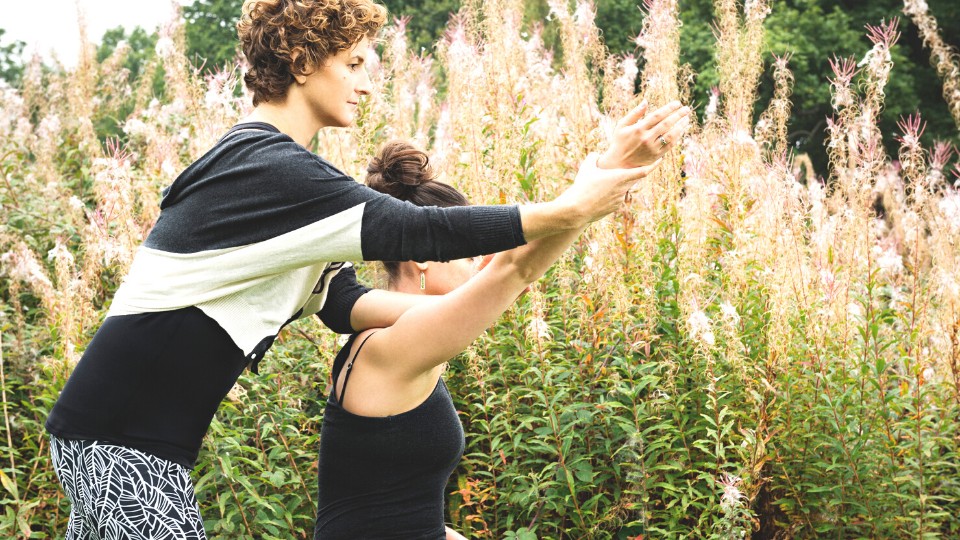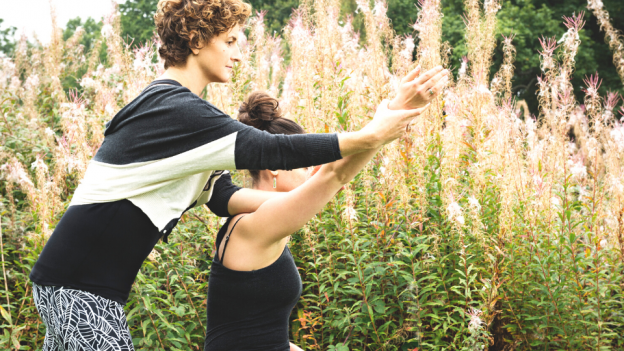
What’s the point and why do I practice? Whether you are new to Yoga, or have been practicing for decades, sooner or later you may ask yourself these questions. Senior teacher Lizzie Reumont shares how body intelligence is a good place to start to find the purpose to your yoga.
The point of practice might be a little different for all of us, but if we look to the ancient texts of yoga, the point has been clearly defined as enlightenment, or samadhi (also known as the state of yoga, as opposed to the practices). But this ethereal word can be so intangible that for many, it seems out of reach, a little bit of voodoo magic, or yet another unattainable thing to strive for.
Another, perhaps more relatable way to express enlightenment, is the state where nothing is missing, where we are ‘in the present moment self’. What’s different about this state than the mode most of us operate in throughout the day? It is that in our day-to-day life most of us are governed by the wandering mind. The mind takes us back to the past and into the future, over and over again, hundreds of times.
In the state of yoga (enlightenment/samadhi), mental activity ceases. None of the ‘mind stuff’ that pulls us in circles from past to future and back again, is there. Being in the present moment requires awareness, attunement and connection, the very things that the yoga practice is made of.

So, how does body intelligence fit into this ‘goal’ of yoga, to be in the present moment? Well, for starters, we tend to think of intelligence as being something that the mind dictates. In our culture, how ‘smart’ we are generally correlates to the size of our vocabulary, our ability to remember facts and figures, or the measurement of our IQ. What we forget is that we have more than this one level of knowledge. In fact, we have three types of intelligence: the head, the heart and the gut. The head generally gets in the way of these other two ‘brains’, to the point that many of us have disconnected from the body altogether.
In fact, we have three types of intelligence: the head, the heart and the gut. The head generally gets in the way of these other two ‘brains’, to the point that many of us have disconnected from the body altogether.
Lizzie Reumont
Ironically, it is the heart and the gut that are the very two elements that operate for us when we are in the present moment. When we talk about intuition or feeling something in our gut, it’s not a metaphor. It’s literal.
Body intelligence is learning to listen to the signs our body has to offer. This might start by simply tuning into the heart and the gut, but as our ability to listen grows, we realise the whole body speaks to us. In fact, one of the key features of practicing yoga is learning to be in a dialogue with your body.
This ‘dialogue’ is important because the body carries information about feelings, and these feelings are key to our connections. Connection is another fundamental aspect of yoga, and an important part of being in the present. In contract, the information the mind offers is wrapped up in beliefs and the stories that support those beliefs. This disconnects us from our present experience and our true nature.
Body intelligence can also be thought of as ‘embodiment’, the state of being present in your body – aware, attuned and connected. Yoga and other movement practices can be a wonderful way to practice being embodied. In order for these practices to be embodied it requires more than following instructions or trying to copy the shapes you might see the teacher, or other students making in a class. It means being aware of proprioception, where you are in space (eg; are your toes pointed forward or splayed out; are your arms both parallel to the ground or is one higher than the other?).
This is an important first step because it involves building awareness through focus and concentration, and this leads us out of our mind and into our body. From this foundation we can begin to notice the parts of our body that are ‘tuning out’ or disengaged, and those that are working over-time to keep up. Being attuned means that you are listening to your body and challenging yourself appropriately. You know what your needs are and what possibilities exist, whilst at the same time you have a lens on your limitations, and honour them.
Lastly, I mentioned that a yoga practice is about connection – in fact yoga means connection. Initially this might be connecting to the earth and your physical body, but ultimately, the goal of yoga is connecting to your true nature, which is only accessible in the present moment.
My teacher says that yoga will give you anything you want – if you want a better bum, yoga can give you that. If you want to master handstands, with enough practice, you can! But a better bum or mastering handstands are short lived goals. Eventually, but inevitably, you won’t be satisfied with these accomplishments, and you will continue to want to attain new and different accomplishments, all of which are temporary.
I challenge you to think big, and choose to use yoga as a tool to end suffering; to be free in your body and mind, in the present moment! If that’s what you’re after, learning to connect with your body’s intelligence is a great place to start.

Thank you to Elizabeth Reumont for sharing her wisdom on body intelligence. Find Lizzie on Instagram, Facebook, or her website: www.freeliz.com
Upcoming in-person workshop: April 10, Surrey
Join Lizzie’s new course on MFML – Your Body Knows Best: Body Intelligence Course.








Leave a Reply